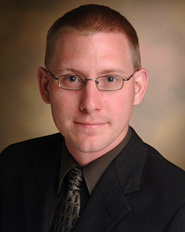
Alan Theisen (b. 4 October 1981; Port Huron, Michigan) is a Ph.D. graduate assistant in the Department of Music Theory at the Florida State University.
Composing since the age of sixteen, he has produced a steadily growing body of work distinguished by its musical energy and concentration of expression.
Representative works by Theisen include a Sonata for Alto Saxophone and Piano, Variations on a Theme of Gretchaninov, Eclogue for flute, and the Concerto for Alto Saxophone and String Orchestra (premiered by soloist Lawrence Gwozdz and the Szczecin Philharmonic in 2004). Recent compositions and commissions include Ritorno for flute and cello and a Triple Concerto. Noted composer Dimitri Terzakis commends Theisen's oeuvre as being "the product of a unique talent."
As a saxophonist, Theisen has toured the United States and Canada with the Sax-Chamber Orchestra, performing at two World Saxophone Congresses (Montreal - 2000, Minneapolis - 2003). He studied the instrument with internationally-recognized performer Lawrence Gwozdz and participated in masterclasses with famed saxophone pioneer Jean-Marie Londeix. No stranger to the podium, Theisen has been a guest conductor with several ensembles.
In an effort to showcase both his own original compositions and pieces by other contemporary composers, he founded the Intégrales New Music Festival in 2005. Now an annual event, Intégrales NMF features world-premiere performances by nationally recognized musicians. Intégrales has expanded to include musical collaborations with artists, authors, and dancers.
Theisen wrote his undergraduate thesis on György Ligeti's Piano Etudes, and has authored several papers on topics including Elliott Carter, film editing, composition as analysis, and Michael Brecker.
Other interests include mathematics, film criticism, and philosophy; in addition, Theisen has performed the role of Oberon in a production of Shakespeare's A Midsummer Night's Dream, for which he also wrote the incidental music.
Theisen lives with his wife (and puts up with their two cats) in Tallahassee, Florida.
|
|
|
|
|
|

Tuesday, June 21, 2005
A Little Clarification / Musings
Oh, yes. I do love Elliott Carter's music (and a hearty thanks to those, like Lawrence Dillon, who have my back). But I certainly do not think he's the only late-20th-century composer of worth; it may seem like I was "dissing" other guys out there, and in a way I am, but the wrath of my pen goes out to a few, not to all.
Aside: Triple-word-score to Mr. Dillon for use of the word "dis".
I love works by Ligeti, Boulez (HEY! No throwing tomatoes!), Xenakis, Dusapin, Berio, Takemitsu, and some pieces by (just in case some folks think I'm being a total jerk) Reich. Late Shostakovich is amazing (personal favorites include the last five string quartets and the 14th and 15th symphonies). Barber Piano Concerto? Awesome!
I'm also a follower of Beck and Radiohead. Any "Midnite Vultures" fans out there?
Regarding the comment that I made earlier about composers these days losing their guts to explore the chromatic language: well, many of these composers "made up" for it by exploring rhythm, timbre, process, collage, etc. My barbs are directed to those "nothing new under the sun" fellows who think that nobody will ever create anything of worth like Brahms or Poulenc did (not that there's anything wrong with Brahms or Poulenc). "Newness" doesn't guarantee greatness, but shouldn't we aspire to put sound in patterns that haven't been made before? As composers, isn't it our task to make connections where none previously existed?
I'd love to write a piece that blended Radiohead's album "OK Computer" with Carter's Symphonia. Now that may be a difficult task....
posted by Alan Theisen
|
| |



